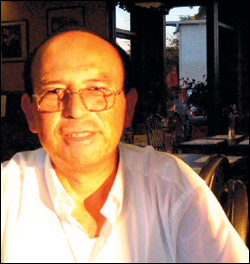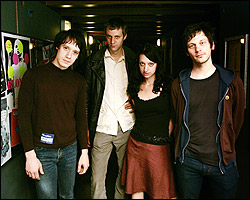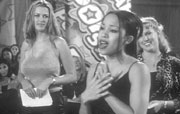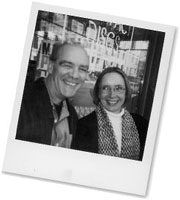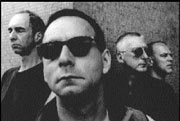Before bluemountain.com, beatgreets.com, or any of the other ridiculous e-card sites, they made musical greeting cards the old-fashioned way. When cards bearing slick, glossy prints of long-stemmed roses or multicandled cakes were opened, a tiny chip was activated and “Happy Birthday” came wafting out of nowhere.
Before he opened our area’s first Peruvian restaurant, Lima native Raul Villalobos made his living importing those cards, only the cards that Villalobos brokered were, technically speaking, playing “Feliz Cumpleaños.” The jump from birthday greetings to ceviche was not as strange as it might seem, but this is because Villalobos has some very experienced friends. Fifteen years ago, as he was breaking into the musical stationery business, friends and fellow Peruvians in Southern California opened what he says was the first Peruvian restaurant in America, and today those friends own 85 restaurants. So when the market took Villalobos’ card business down the tubes, he went to them for advice.
“They told me, ‘Raul, this is your time,'” recalls Villalobos, with what has to be one of the best smiles in all of Seattle. It seems his friends were right; El Chalan sits on the outskirts of White Center—which is itself on the outskirts of West Seattle—and with a diverse ethnic community and a growing economy, White Center is quickly becoming the not-so-secret gem of the South End. The polar opposite of Queen Anne, White Center may not be squeaky clean and there are very few charming Craftsman bungalows in the 98146 area code, but you won’t find many awesome authentic taco carts, eclectic Asian restaurants, ethnic grocery stores, and wonderfully sinful Salvadorian pastry shops in 98109, either. And you definitely won’t find another El Chalan.
IN WHAT WAS most recently an Ezell’s Famous Chicken, Villalobos’ sister and chef, Adita Villalobos, makes seafood dishes capable of making grown men cry. The jalea especial ($16 for a medium plate, which is enough for two, or $30 for a large, which can feed a well-mannered family) is what fish and chips dream of being. This is what deep fryers were made for: Under a pile of paper-thin-sliced marinated red onions sit breaded calamari, shrimp, mussels, and fillets of catfish; a tangy essence of lime and cilantro is immediately present, and welcome, when the dish gets to your table.
If you ask Villalobos about the more subtle hints of bright fresh color, he’ll flash that winning smile and tell you only that those are his secrets. (He told me that when the chefs from Salty’s on Alki recently dined at El Chalan, they begged to know about those bright and unusual flavors, too. They also got only the smile.) Villalobos uses herbs, spices, and produce imported from—and specific to—Peru. In the jalea, you’ll also get plenty of the huge corn, or maiz, kernels and yucca root that come in those shipments.
One of the amazing things about the jalea is that it makes ordinary fish extraordinary. You expect great things from salmon and tuna, but catfish? This is also the case with the distinctly Peruvian dish ceviche; Villalobos uses sole, but renders it exceptional. Given the same treatment of lime, cilantro, onions, and Villalobos’ secret ingredients—except not fried like the jalea, but rather marinated in the acidity of the citrus and “cooked” without heat—the ceviche ($10, $16, and $28 for small, medium, and large portions of fish only; $11, $18, and $20 for mixed seafood) is as wonderful as the jalea, and much healthier.
El Chalan also offers several meat entrées. Villalobos recommended that my friend try the seco norteño ($12), a beef stew seasoned with cilantro and mild Peruvian peppers, and tallarin verde con bistek ($10), a pasta dish in a creamy basil and spinach sauce, with a lean, pounded steak. Appetizers include two potato specialties: Papa a la Huancaina ($4.50) is sliced potatoes in a thick cheese sauce, garnished with hardboiled egg; ocopa ($5) is very similar, but the addition of huacatay, a black Peruvian mint, makes the dish even more distinctive.
Even the drinks, all nonalcoholic —but only, knock wood, until the liquor license goes through—are notable. Inca Kola ($1.50) has clout that Coke just doesn’t, and the chicha morada ($1.49 for a glass, $5.99 for a pitcher), a Peruvian iced punch made by soaking purple corn in a mixture of pineapple juice, apple, cloves, cinnamon, and anise, is like having Christmas in July. The drink is even said to promote healthy digestion.
VILLALOBOS NAMED his restaurant after the Peruvian cowboys who train dancing horses for show and competition. Shortly after opening, he heard from a transplanted chalan in Yakima, who told Villalobos that maybe he could bring his animals to the restaurant for a special event. Considering the remarkable dishes at El Chalan and the fact that Villalobos, following the lead of his enterprising friends in California, already has plans for three more restaurants in the Northwest, celebration seems eminent. But with food this good, you don’t want to wait around for the dancing horses.
El Chalan, 11060 16th Ave. S.W., 206- 444-4747, WHITE CENTER. Breakfast 10– 11 a.m. Tues.–Sun.; lunch and dinner 11 a.m.–9 p.m. Tues.–Sun.
